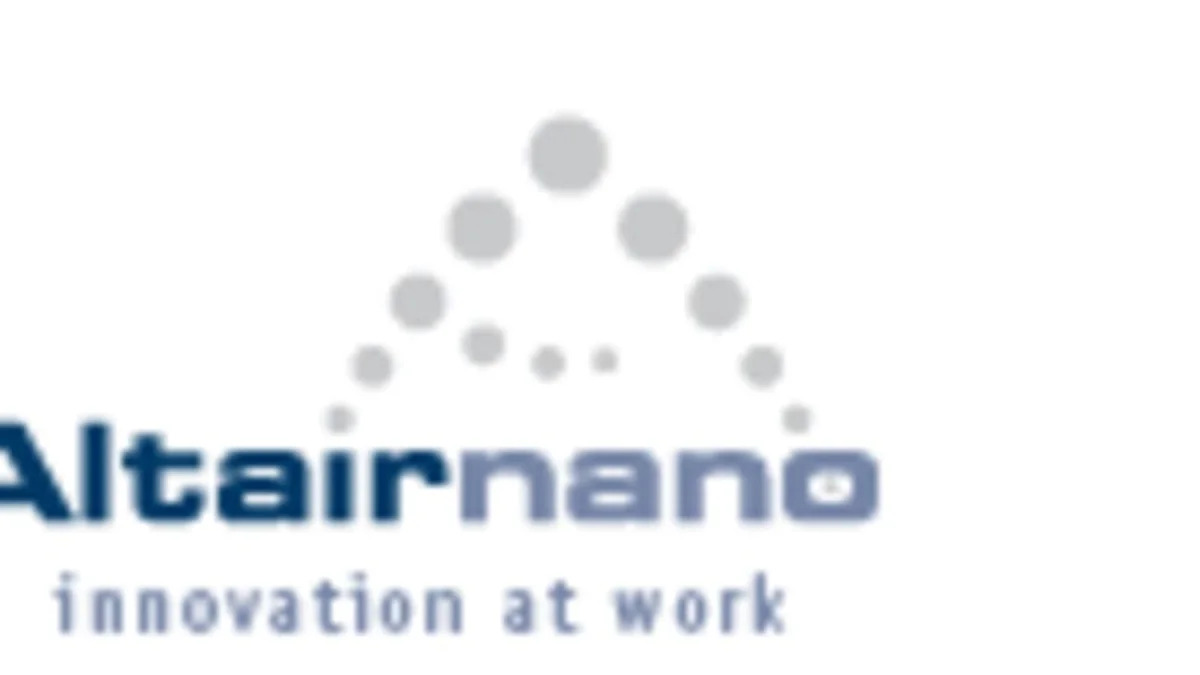On Wednesday afternoon, Dr. Alan Gotcher of Altair Nanotechnologies broke down his company's batteries. Not physically, but verbally and with Powerpoint slides. In a room full of battery experts, Gotcher explained why his company's NanoSafe batteries are the top of the line. No one got up to call him a liar when he described these greatly improved batteries, in part because most of this information has been floating about for a while, and in part because he had the data to back up his claims.
Standard li-ion batteries, like those used in laptops and cell phones, charge in about two to six hours, have a power density of less than 1,000 watts per kilogram (W/Kg), and have a lifespan of less than 1,000 cycles (full discharge). NanoSafe batteries, which use li-ion but have the graphite in the anode electrode material replaced with nano-titanate. This change gives them vastly better numbers. We're talking batteries that can be charged in less than 10 minutes, have a power density of 4,000 W/Kg, and can retain 85 percent of their charge 20,000 charge cycles. Combine this with a wider operating temperature range (between -50 to 75 degrees C) than standard li-ion batteries, an expected life of 12-20 years (depending on use) and batteries that have not smoked or caught fire in any of the standard battery tests, and you've got a battery with great potential for automotive use.
At least one car company thinks so. As we've mentioned before, Phoenix motorcar and Altair will be releasing an electric truck in the spring of 2007 that uses a 35,000 Watt-hour NanoSafe battery-pack. The truck is expected to have a range of 136 miles, a top speed of 95 mph, and a recharge time of less than 10 minutes. These numbers are slightly different that what was reported earlier: a 85 mph top speed and 120 mile range.
More battery news, from Tesla and ZENN, in a little bit.
Standard li-ion batteries, like those used in laptops and cell phones, charge in about two to six hours, have a power density of less than 1,000 watts per kilogram (W/Kg), and have a lifespan of less than 1,000 cycles (full discharge). NanoSafe batteries, which use li-ion but have the graphite in the anode electrode material replaced with nano-titanate. This change gives them vastly better numbers. We're talking batteries that can be charged in less than 10 minutes, have a power density of 4,000 W/Kg, and can retain 85 percent of their charge 20,000 charge cycles. Combine this with a wider operating temperature range (between -50 to 75 degrees C) than standard li-ion batteries, an expected life of 12-20 years (depending on use) and batteries that have not smoked or caught fire in any of the standard battery tests, and you've got a battery with great potential for automotive use.
At least one car company thinks so. As we've mentioned before, Phoenix motorcar and Altair will be releasing an electric truck in the spring of 2007 that uses a 35,000 Watt-hour NanoSafe battery-pack. The truck is expected to have a range of 136 miles, a top speed of 95 mph, and a recharge time of less than 10 minutes. These numbers are slightly different that what was reported earlier: a 85 mph top speed and 120 mile range.
More battery news, from Tesla and ZENN, in a little bit.


Sign in to post
Please sign in to leave a comment.
Continue